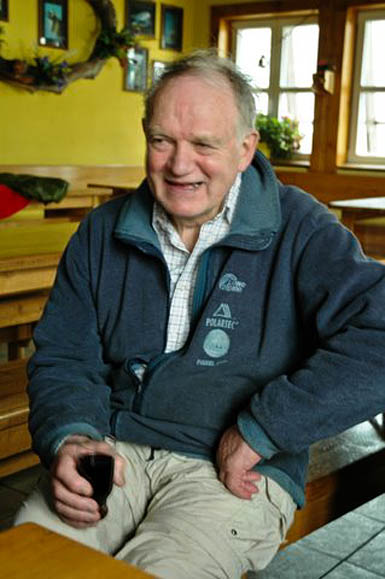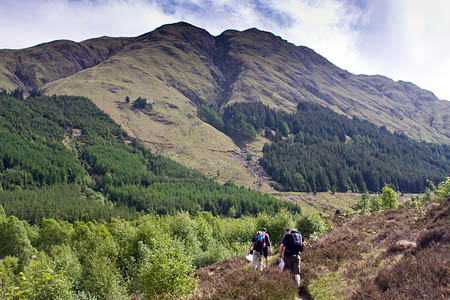A leading mountaineer who was instrumental in establishing the right to roam in Scotland has died at the age of 78.
Alan Blackshaw was a past president of both the British Mountaineering Council and the Alpine Club, and whose influence was felt both at home and abroad.
Mr Blackshaw, who had non-Hodgkin’s lymphoma, was also a leading light in the Union Internationale des Associations d’Alpinisme, the worldwide body representing mountaineers.
He was a fierce advocate of access and conservation and played a key part in the introduction of the Land Reform (Scotland) Act in 2003, which gives the public access unequalled elsewhere in Britain to the countryside north of the border.
He questioned the financial basis for the controversial Cairn Gorm funicular railway and advocated less intrusive skiing developments in the Cairngorms.
The Liverpool-born former high-ranking civil servant served in the Royal Marine Commandos after gaining a modern history degree at Wadham College, Oxford. He will be remembered by many as the author of the Penguin handbook Mountaineering: from Hillwalking to Alpine Climbing and as editor of The Alpine Journal.
Narinda Vohra, Governor of Jammu and Kashmir Province in India, and a former Indian Mountaineering Federation representative to the UIAA, said Blackshaw had ‘altogether fearless and straightforward views on major issues and impeachable intellectual integrity, whether in the arena of civil services or mountaineering’.
Dave Morris, director of Ramblers Scotland, to which Mr Blackshaw was an adviser, said: “Alan Blackshaw was an outstanding influence, over many decades, in the development of mountaineering both within the UK and further afield and, within Scotland, was a key figure in many access and conservation issues.
“He played a vital role in the delivery of the right-to-roam legislation passed by the Scottish Parliament in 2003 and, in striving for better development options for downhill skiing in the Cairngorms, was a strong critic of Highlands and Islands Enterprise and their promotion of the funicular railway.”
Mr Blackshaw, who died on 4 August at Inverness, leaves a widow Elspeth, their son and two daughters, and a daughter from a previous marriage.
Dave Morris paid this tribute to the mountaineer:
“Like the mountains he loved, Alan Blackshaw appeared to be indestructible. You could not wish for a better companion with whom to face the storms of life. From the struggle to the summit of the mountain to the battles with bureaucracy in the lowlands, Alan was the guy you wanted on the other end of your rope.
“For anyone who enjoys the world of outdoor adventure it is Alan’s contribution to public and political understanding of the customs, traditions and rights by which we take access to land and water that is his most significant achievement.
“His research work and advocacy underpinned the rights of public access secured by the Land Reform (Scotland) Act 2003. Nobody else made such a massive contribution to the process which culminated in the Scottish Parliament passing this world-class legislation, of benefit to every citizen who wants to step into the outdoor environment.
“But his knowledge and determination to protect the public interest extended well beyond the contribution he made to Ramblers Scotland and the other organisations who worked to deliver this legislation. As a key figure in the International Mountaineering and Climbing Federation [the UIAA] he pursued the principle that the right to experience and enjoy nature through access to most land and water should be recognised at the United Nations level, as a fundamental human right for all people.
“I first spoke to Alan in 1984, seeking his advice on equipment to use on a ski journey through northern Norway and Sweden.
“As a mountaineer and skier who not only explored the remote and wild places but also wrote extensively on how to do it, Alan was the best source of advice, always willing to help. But it was only from the mid 1990s onwards that his prodigious knowledge, expertise and work capacity became obvious to me.
“On many a late evening I discussed with Alan the latest twists and turns as negotiations progressed towards the land-reform legislation and many other issues affecting public enjoyment of the outdoors.
“Time and again I would find on my computer, first thing next morning, a detailed analysis of the issue, backed up with historical evidence, extracts from court cases, statements by experts etc. If there was a job to be done you could depend on Alan to do it, whatever the time of day or night.
“From a career in the civil service, culminating in his role as the Director General of the Offshore Supplies Office in the days when the UK Government was a major player in North Sea oil development, Alan understood how the machinery of government operated.
“That was invaluable when he subsequently held board positions on organisations like Scottish Natural Heritage and the Scottish Sports Council. In later years, this understanding, combined with a deep founded commitment to protecting the integrity of the democratic process and the wise use of public funds, strengthened his ability to question public bodies on their actions.
“So the Crown Estate Commissioners came under challenge over their attitude towards ownership of the Cuillin mountain range on Skye, while Highland and Islands Enterprise found their financial support for the Cairngorms funicular railway project under intense scrutiny and subsequent parliamentary criticism, with much of the key evidence flowing from Alan’s research.
“Despite his long term support for downhill ski developments in the Cairngorms, Alan was a key figure in questioning the value of the funicular project, promoting alternative development schemes which would deliver better value for skiers and other outdoor recreation interests along with less environmental impact.
“And so to Alan’s final battle with cancer, while still enjoying the chat in his fine house in Newtonmore, with family members close by in recent months and a cup of tea or glass of wine always on offer – except of course when he took off last autumn with two companions to sail a small boat across the Atlantic to South America.
“Ever the optimist, Alan was always there for the challenge, always ready to do what really had to be done.
“Now the rest of us can be thankful for that guy on the other end of the rope, wherever we are, on land or water. And our thoughts are with Elspeth and the family at the passing of someone who made a difference, in every place, in every way.”
Mr Blackshaw’s funeral will take place at the Cathedral Church of St Andrew, Inverness, on Friday 19 August at 1.15pm. Donations will be collected for the East Africa Crisis Appeal.


ian
12 August 2011Great guy. Inspirational - and what a contribution he made in so many areas.